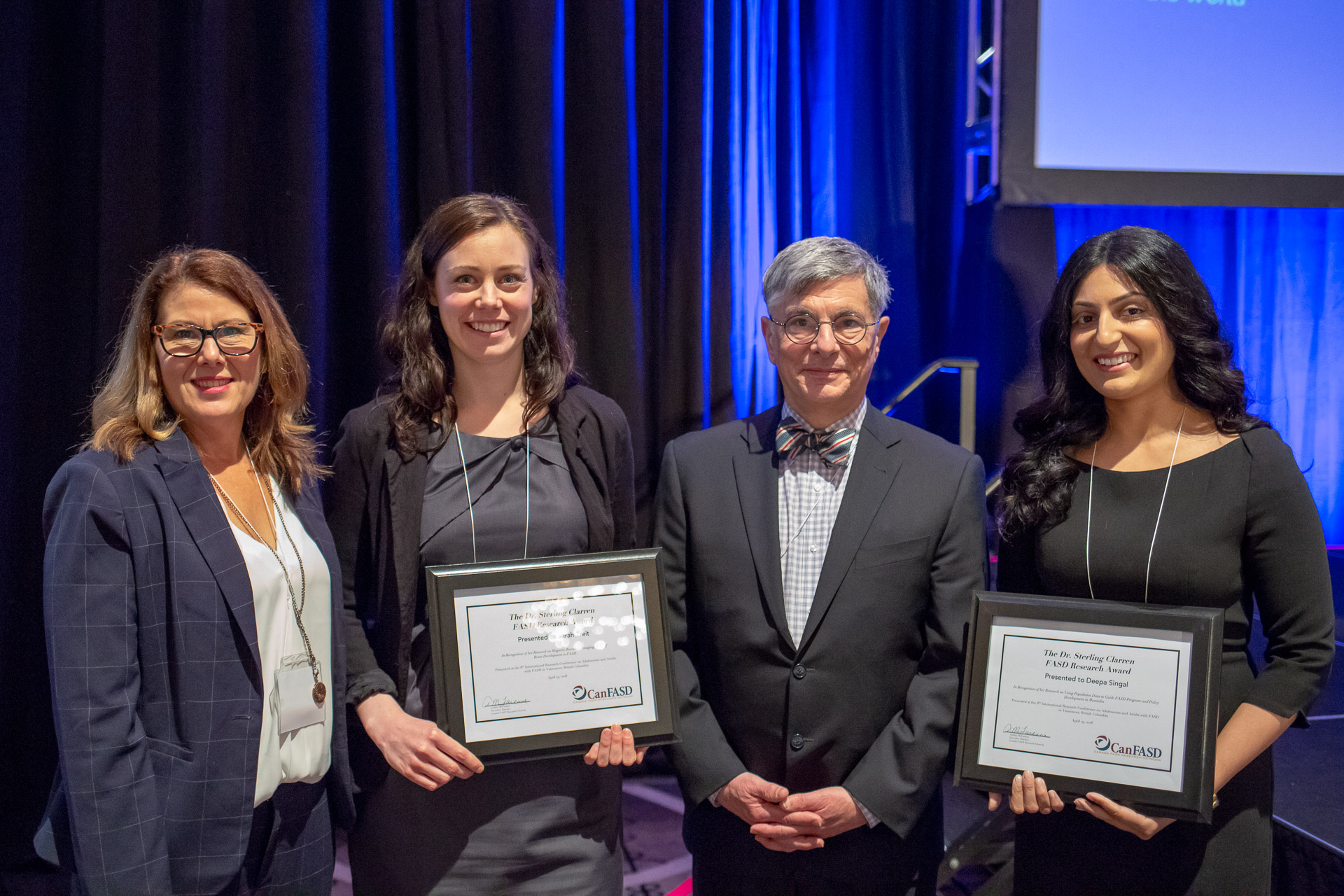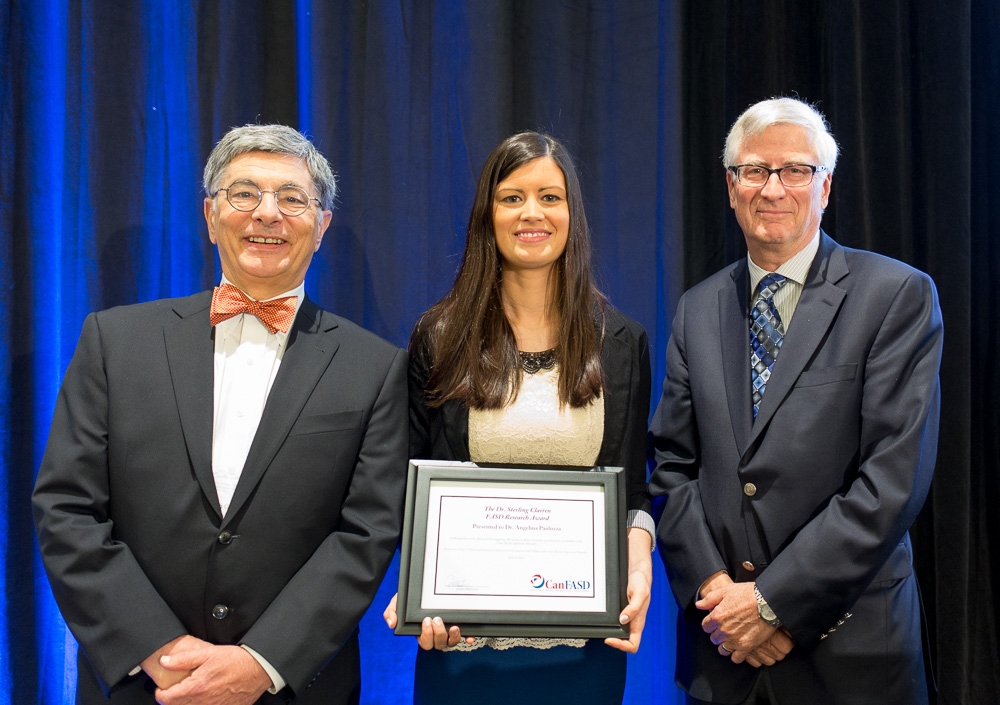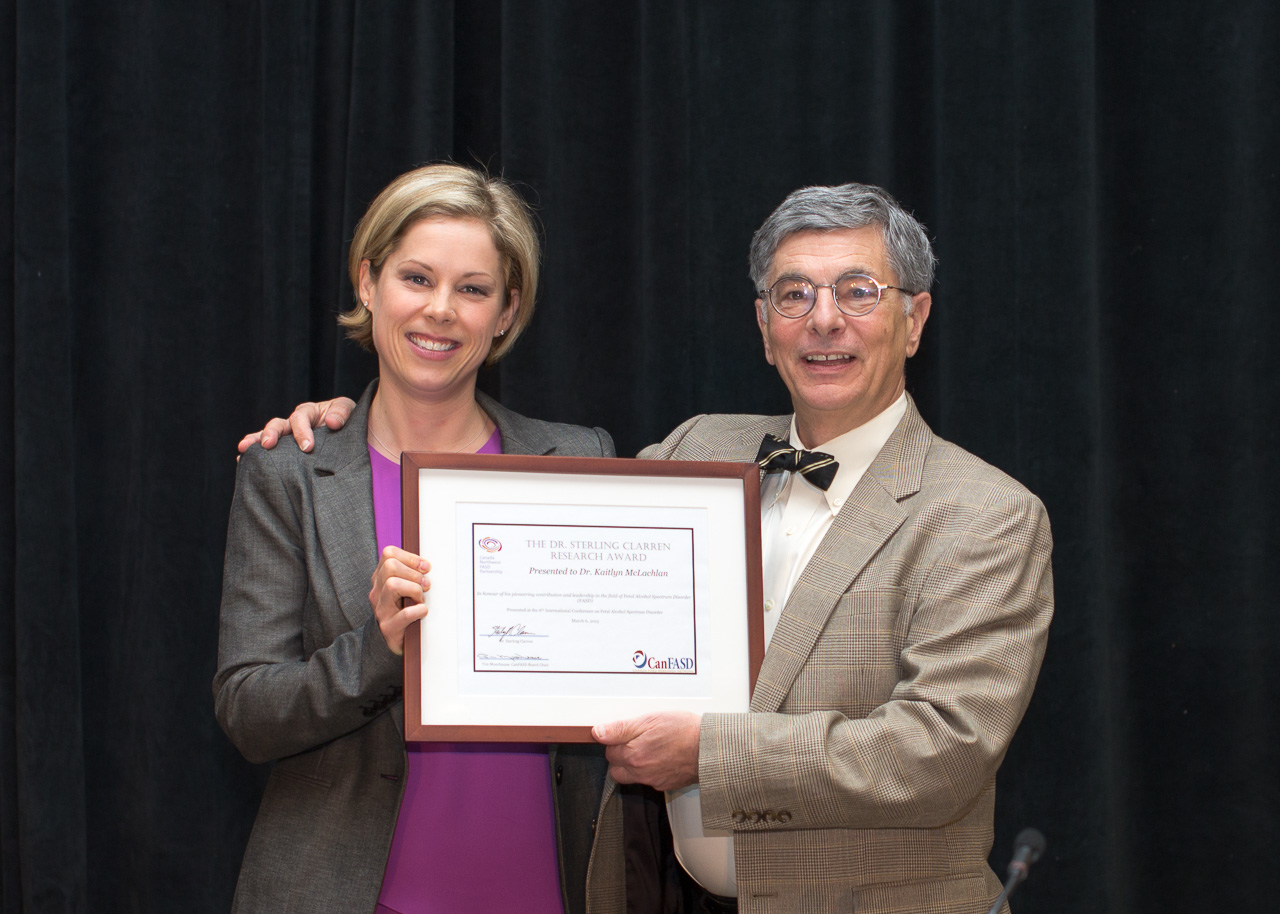2022 Recipients: Melody Morton Ninomiya, Ph.D., and Preeti Kar, Ph.D.

Dr. Ninomiya’s Project Details:

Dr. Kar’s Project Details:

2021 Recipient: Brianne Redquest, Ph.D.
Dr. Redquest’s Project Details:

2020 Recipient: Mr. John Aspler
Mr. Aspler’s Project Details:
Fetal alcohol spectrum disorder in Canadian print news media : A study of media discourse and key stakeholder perspectives
We analyzed more than a decade of news coverage from the top ten English-language Canadian newspapers to understand the kind of information the Canadian public receives about FASD, alcohol, and pregnancy. While some of the coverage was excellent, we also found examples of exaggerated, contradictory, and contextless science and health reporting. In addition, we identified several common FASD stereotypes – namely, people with FASD presented as criminals – and coverage that did not explore why someone might consume alcohol while pregnant. After we finished our analysis of Canadian news, we wanted to know how the people affected by that coverage might feel about it. To address that question, we conducted twelve focus groups with people with FASD, their parents, and the professionals who care for them. We asked them about their experiences with FASD, alcohol, and pregnancy, about FASD stereotypes, and we showed them quotes from our media analysis to discuss their reactions.

2019 Recipient: Dr. Tamara Bodnar
Dr. Bodnar’s Project Details:
Impact of prenatal alcohol exposure on immune function throughout the lifecourse
My work involves understanding how immune function is altered with prenatal alcohol exposure (PAE) throughout the life course. Importantly, while the immune system protects the body against disease, it is also critically important for brain development. Using an animal model of PAE, we showed increased activity of the immune system within the brain during a critical period of early brain development. Building on these data, we subsequently examined whether the immune environment is altered with alcohol- consumption in pregnant women. Importantly, we identified distinct networks of activated and inhibited cytokines, critical immune system messengers, that were associated with alcohol consumption during pregnancy and subsequent neurodevelopmental delay in the children of these mothers. Finally, as an extension of these data, and inspired by an informal health survey conducted by individuals with FASD, we are currently evaluating health and immune function in adults with FASD.

2018 Recipients:
Dr. Sarah Treit and Dr. Deepa Singal
Dr. Singal’s Project Details:
Using Population Data to Guide FASD Program and Policy Development in Manitoba
FASD is a significant public health issue, particularly in Manitoba, which has some of the highest rates of FASD in Canada. The provincial government has spent millions of dollars in diagnostic, prevention, and support programs, however, the evaluation capacity of these programs is limited. The program of work will leverage the world’s most powerful and comprehensive collection of health and social databases, housed at the Manitoba Centre for Health Policy to enhance the provincial government’s ability to evaluate “big data” to conduct novel clinical and health services research in the area of FASD. This program of work ensures services and programs targeted at improving the lives of people with FASD in Manitoba are based on strong research and evaluation. This work not only substantially increases research and evaluation capacity in the field of FASD at the provincial level, but most importantly advocates for human centered resources and programs to increase the health and wellbeing of people with FASD.
Dr. Deepa Singal is a Canadian Institutes for Health Research Health Systems Impact Fellow at the Manitoba Centre for Health Policy and Health Child Manitoba Office, Government of Manitoba. Deepa has a mission to use linked health and social administrative data to enhance the health and wellbeing of children and mothers in Canada. She leads two programs of research: (1) Her doctoral dissertation which was the first population based study to investigate maternal risk factors, physical and mental co-morbidities and system use of women who have given birth to children with Fetal Alcohol Spectrum Disorder; (2) One of the largest studies in the world investigating adverse outcomes of children exposed to antidepressants and psychotropic drugs in utero. In her fellowship, Deepa works closely with a Senior Assistant Deputy Minister to deliver the government of Manitoba’s objectives of using evidence based decision making in developing and evaluating provincial strategies that impact the health of mothers and children. Dr. Singal is an author of a dozen peer-review articles (including over two thirds as first author), over half a dozen government reports, and has garnered over half a million dollars in competitive funding. Findings of her dissertation were publicized by national media outlets, including: a CTV evening news interview, The National Post, CITY TV, CBC and CTV National News. Dr. Singal is the recipient of The Research Manitoba Dissertation Award, The Children’s Hospital Research Institution of Manitoba Foundation Award, and the Dr. Sterling Clarren FASD Early Investigator Award. Deepa hopes to forge a hybrid career path between academia and policy.
Dr. Treit’s Project Details:
Magnetic Resonance Imaging (MRI) of Brain Development in FASD
Despite obvious behavioural and cognitive impairments, brain abnormalities in FASD are not typically ‘visible’ with routine clinical brain imaging. Advanced MRI methods have uncovered differences in brain structure in FASD, but little was previously known about brain development with age in this population. I conducted a longitudinal MRI study of children and adolescents with FASD (ages 5-15 years) scanned twice each (2-3 years apart), revealing delayed development of white matter (brain ‘wiring’) and cortical grey matter maturation. Delayed structural development may partially explain worsening of behavior commonly observed during this critical adolescent time period. In a separate study, I scanned ~70 children, adolescents and adults with FASD, and ~70 healthy controls at a single time point, and found greater reductions in brain volume among males than females with FASD, despite similar impairments in cognition. This suggests that prenatal alcohol exposure may affect brain structure differently in males versus females.

2017 Recipient: Ms. Kelly Coons
Dr. Kelly Coons completed her PhD in Interdisciplinary Rural and Northern Health at Laurentian University under the supervision of Dr. Shelley Watson. Kelly’s doctoral work focused on health care students practicing in rural and Northern Ontario and their knowledge, attitudes, and self-efficacy regarding FASD and alcohol consumption during pregnancy. Kelly presented some of her doctoral research at the 7th International Conference on Fetal Alcohol Spectrum Disorder in March 2017.
Project Details:
Northern Ontario Health Care Students’ Knowledge and Self-Efficacy Regarding Fetal Alcohol Spectrum Disorder
The current research project explored the knowledge, attitudes, and beliefs held by future health care professionals about Fetal Alcohol Spectrum Disorder (FASD) and alcohol use during pregnancy. Health care students from Sudbury and Thunder Bay were asked to answer two questionnaires about their knowledge and self-confidence working with patients with FASD or with pregnant women. Students were also asked to participate in an interview and to complete a scenario-based story about their patient counselling on drinking during pregnancy. Although all students were aware of FASD, they believed that additional training and education about FASD and alcohol use during pregnancy was required to help prevent FASD. Students stated that the safest recommendation is not to consume any alcohol if you are pregnant. However, students also held the belief that experts do not know how much alcohol is safe during pregnancy. Women of childbearing age, whether planning to become pregnant or not, should be informed of the risks of drinking during pregnancy. The results of this study will improve future health care professionals’ confidence and knowledge about FASD and their ability to appropriately counsel pregnant women about the potential risks of drinking alcohol during pregnancy.

2016 Recipient: Dr. Angelina Paolozza
Dr. Paolozza completed her PhD at Queen’s University under the supervision of Dr. James Reynolds. She worked on a pan-Canadian, multi-site study funded by NeuroDevNet, which investigated multiple research techniques to further the development of screening tools for clinical populations. She presented her doctoral research at the 7th National Biennial Conference on Adolescents and Adults with Fetal Alcohol Spectrum Disorder in April 2016.
Project Details:
Alterations in Brain Structure and Function in Children and Adolescents With Fetal Alcohol Spectrum Disorder
This project was a multi-site study of the functional outcomes (i.e., performance on cognitive and eye movement control tasks) among Canadian children and adolescents with FASD. We also explored the relationship between functional outcomes and white matter in the brain using magnetic resonance imaging (MRI). Performance on eye movement tasks successfully differentiated children and adolescents with FASD from typically-developing controls on both sensory-motor and behavioural outcomes. Children and adolescents with FASD showed deficits on a number of cognitive tasks and eye movement activities. Specifically, they showed impairments in set shifting, inhibition, attention, working memory, and visuospatial processing. The MRI results also revealed deficits in the organization of major white matter tracts in the brain. Three assessment techniques (MRI, eye tracking, and cognitive testing) were examined to identify pathways in the brain involved in specific behavioural deficits, and we found that deficits in eye movement control in children and adolescents with FASD were linked with specific behavioural outcomes and structural anomalies in the brain. This research contributes to the literature on the development of tools for large scale screening of clinical populations, and may help streamline the diagnostic process by more rapidly identifying children and adolescents who would most benefit from full diagnostic assessment for FASD.

2015 Recipient: Dr. Kaitlyn McLachlan
Dr. McLachan was the inaugural recipient of the Dr. Sterling Clarren Research Award in 2015. She completed her PhD in Clinical Psychology at Simon Fraser University, specializing in Forensic Psychology. In her post-doctoral research work, Dr. McLachlan played an integral role in the NeuroDevNet study of the impact of prenatal alcohol exposure on the diurnal rhythm of cortisol in children and adolescents. She presented some of this research at the 6th International Conference on Fetal Alcohol Spectrum Disorder in March 2015.
Project Details:
Early Life Adversity Gets Under the Skin: Prenatal Alcohol Exposure, Environmental Influences, and the Diurnal Cortisol Rhythm
Early development of the human stress response system can be negatively impacted by many pre- and postnatal factors with lifelong consequences. This project evaluated whether the daily rhythm of the stress regulation system is changed in children and adolescents with prenatal alcohol exposure (PAE) and significant early life adversity relative to healthy developing controls. This novel study was one of the first to assess diurnal rhythm of cortisol in humans with PAE, and one of few to explicitly consider the role of early life adversity. We found that participants with PAE and early life adversity had significantly higher evening cortisol concentrations and a flatter diurnal slope compared to controls, particularly among children with both PAE and low socioeconomic status. Altered cortisol concentrations across the day were associated with environmental adversity, whereas a key protective factor, early assessment, was associated with more typical diurnal rhythms. These data suggest that alcohol exposure in utero may increase vulnerability to the impact of environmental adversity, possibly due to sensitization of the HPA axis by PAE.
